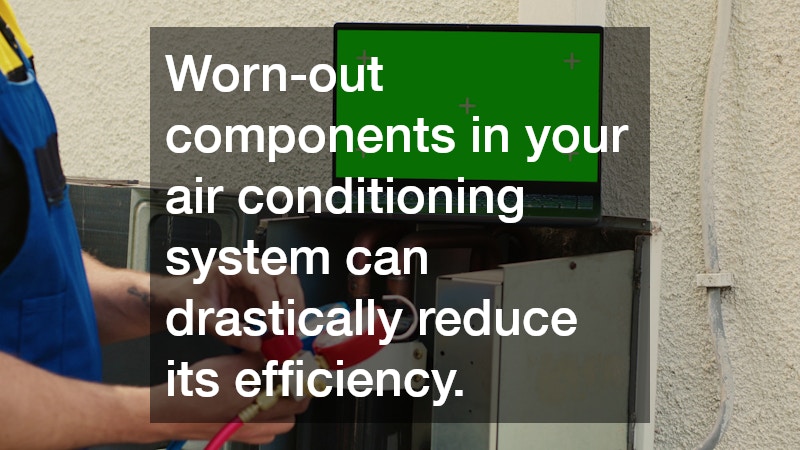Why Timely AC Repair Can Save You Money on Energy Bills
In the sweltering heat, an efficient air conditioning (AC) system is a necessity, not a luxury. Many homeowners underestimate the impact that a well-maintained AC can have on energy bills. Timely repairs not only optimize your comfort but can also significantly cut down on energy costs. This article will delve into the frequently asked questions about AC repair and its financial benefits.
How Does Timely AC Repair Enhance Energy Efficiency?
The Impact of Worn-Out Components on Efficiency
Worn-out components in your air conditioning system can drastically reduce its efficiency. Over time, parts such as the fan motor, capacitors, or evaporator coils may degrade or malfunction. When this happens, the system must work harder to perform its cooling function, leading to increased energy consumption. Timely AC repair addresses these issues, restoring the unit’s efficiency and reducing unnecessary energy expenditure.
One of the critical tasks during an AC repair is the inspection and replacement of worn-out components. A professional technician can identify and fix issues that may not be obvious to the untrained eye. By replacing faulty parts, the air conditioner can maintain proper airflow and temperature regulation, which are essential for optimal performance. Thus, ensuring all components are in good working order helps maintain low energy bills.
The Role of Refrigerant Levels in Energy Consumption
Refrigerant levels play a crucial role in the energy efficiency of your AC unit. When the refrigerant is low, the system cannot adequately cool the air, forcing it to run longer and consume more electricity. In some cases, leaking refrigerant might even lead to complete system failure if not addressed promptly. Timely repairs ensure that refrigerant levels are checked and topped off as necessary, thus maintaining efficiency.
A well-functioning AC unit requires optimal refrigerant levels to effectively absorb and release heat. An imbalance can strain other components, such as the compressor, leading to increased energy use. Regular maintenance, including checks of refrigerant levels, helps prevent common issues associated with low refrigerant, such as increased wear and tear and rising electric bills.
Regular Maintenance and Airflow Optimization
Regular maintenance is vital for optimizing airflow and ensuring peak performance of your AC system. Over time, dust, debris, and other particles can clog filters and ducts, hindering the unit’s ability to circulate air efficiently. This restriction not only decreases efficiency but also forces the system to use more energy, driving up utility bills. Timely AC repair and maintenance routines help optimize airflow, ensuring that the system operates at its best.
Technicians can perform routine maintenance tasks, such as cleaning or replacing air filters, inspecting ductwork for obstructions, and adjusting airflow settings to meet specific needs. By doing so, they address any minor issues before they escalate into significant problems. Enhanced airflow not only improves comfort levels but also lessens the burden on the AC unit, thus conserving energy and reducing costs.
Can Delaying AC Repairs Increase Your Energy Bills?
Potential Risks of Ignoring Minor AC Issues
Ignoring minor issues with your AC system might seem like a way to save money on repairs, but it often leads to increased energy bills. Small problems, such as unusual noises or minor leaks, can be symptoms of larger, underlying issues. When left unaddressed, these can cause your system to operate inefficiently, consuming more energy than necessary. The risk of delaying repairs is not limited to increased energy usage. Over time, minor problems often escalate, leading to more severe damage and higher repair costs in the future. Addressing these issues promptly with timely AC repairs minimizes the risk of costly setbacks and ensures continued efficiency, keeping energy bills at a manageable level.
How Small Inefficiencies Accumulate Over Time
Small inefficiencies in an AC system can accumulate over time, gradually increasing energy consumption and costs. Initially, these inefficiencies may go unnoticed, but their compounded effect ultimately results in a less efficient system. For instance, a slightly blocked filter might not seem critical, but it gradually reduces airflow, causing the unit to work harder and use more electricity.
Regular maintenance and timely AC repairs can address these small inefficiencies, preventing them from developing into larger, more damaging problems. By conducting routine inspections and cleaning, technicians can restore the unit’s optimal performance, ensuring it operates as efficiently as possible.
The Cost Comparison: Repairs vs. Increased Energy Bills
When evaluating the cost of timely AC repairs versus the potential increase in energy bills, it becomes clear that prompt action is economically advantageous. While the immediate expense of repairs may seem significant, allowing minor issues to persist often results in far greater financial impact due to increased energy consumption and possible system failures.
By investing in timely repairs, homeowners can ensure that their systems operate at peak efficiency, minimizing electricity use and keeping utility bills in check. Over time, these savings can offset the initial costs of repair, making it a smart financial decision for any household.
Conclusion
Timely AC repairs are crucial for maintaining energy efficiency and keeping utility bills in check. By addressing issues promptly and choosing the right service provider, you can prevent costly breakdowns and enjoy a comfortable living environment. Taking a proactive approach to AC maintenance not only saves you money in the long run but also ensures the longevity and effectiveness of your cooling system.

